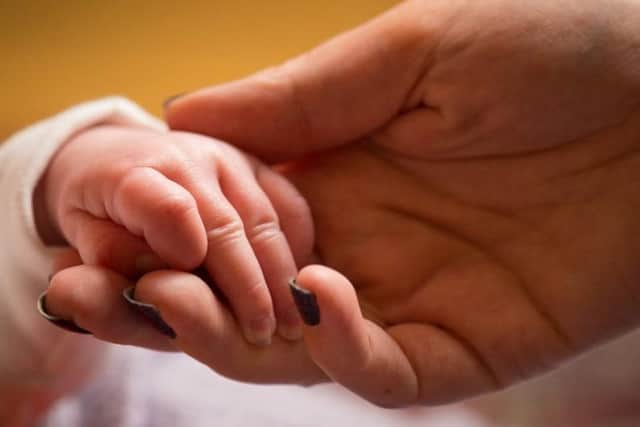Inquiry at Preston and Chorley hospitals after four 'shaken' babies suffer 'traumatic' head injuries in quick succession
and live on Freeview channel 276
All were feared to have been badly hurt because they were violently shaken after being discharged, triggering an investigation at the Lancashire Teaching Hospitals NHS Foundation Trust, which runs Preston and Chorley hospitals.
An "in-depth" review of each case was ordered by the trust's nursing and midwifery chief to spot any "theme or trends", as well as any health service failings.
Advertisement
Hide AdAdvertisement
Hide AdThe number of incidents in such a short time - all four unidentified youngsters were hurt in 2018 - was said to be a particular concern.


A three-page summary, which focused on the health service and did not say whether the children survived or if their alleged abusers faced prosecution, revealed:
* Two of the cases were "referred for serious case reviews" while the other two exposed "clear lessons to learn within the organisation";
* There was a failure to carry out routine enquiries into the parents' mental health, and potential domestic abuse;
Advertisement
Hide AdAdvertisement
Hide Ad* Independent panels could now be set up to comb through past cases; and
* Changes would be made to "allow midwives that are seeing different women to understand the risks more easily" and so supervision of the midwifery team can be "strengthened".
The trust initially refused to hand over the document, citing concerns over confidentiality, but eventually released a redacted version following an appeal by the Post.
It said there had been "five recent cases that have resulted in non-accidental injuries to children" but added: "For clarity, three of the cases are non-accidental injuries, one baby admitted with bruising, and one very recent case with a possibly non-accidental injury that is currently subject to a second opinion."
Advertisement
Hide AdAdvertisement
Hide AdIt said in a statement: "We requested a view from the chair of the children’s safeguarding board because we wanted to understand whether there was anything more we could do to support mums and their babies who may be vulnerable following a cluster of similar cases.
“There is always learning from cases of this nature and, in addition to this, many instances of good practice were also identified. The review resulted in some recommendations which have now been taken on board.
“These include ensuring that all complex women have a named midwife during pregnancy and continuity of carer before, during, and after they have given birth, which is particularly important to people with complex social needs and increases the likelihood of women sharing social circumstances with the midwife that may affect their ongoing health and that of their baby.
“The named midwife now also supports and case manages pregnant teenagers.
Advertisement
Hide AdAdvertisement
Hide Ad"Through this work, we have demonstrated improved use of routine questions relating to domestic abuse and mental health and have provided additional awareness training to ensure complexity is understood and recognised by all staff working across maternity services.”
Babies can suffer brain damage or die after just a few seconds of shaking, with abusive head trauma - once known as shaken baby syndrome - the most common cause of death or long-term disability in babies.
Because their necks are underdeveloped and weak, babies cannot support their own head so, when shaken, their brains bounce back and forth inside their skulls, tearing blood vessels and causing horrific damage.
Symptoms appears almost immediately and include difficulty breathing, turning blue, seizures, and loss of consciousness.
Advertisement
Hide AdAdvertisement
Hide AdAround 20 infants in the UK are hurt this way every year, a report by the children's charity NSPCC found, though child protection expert Dr Suzanne Smith said last year she believe official figures are "the tip of the iceberg".
The former safeguarding nurse said: "I've seen the devastating impact of shaking babies ... where babies have died or suffered extremely severe disabilities, and we need to do more to prevent it."
Last year, a new campaign was launched across Lancashire to help parents cope with a crying child after "a number of infant deaths and serious case reviews where a baby has died or been seriously injured as a result of abusive head trauma".
According to briefing material sent out to professionals, one of the project's aims was to "let parents/carers know that infant crying is normal and equip them with skills to cope".
Advertisement
Hide AdAdvertisement
Hide AdIn 75 per cent of cases, the parents are to blame, and it's usually the baby's dad or the mother's partner, statistics showed.
Babysitters have also been known to harm children in their care.
Crying is the most common trigger.
"Studies show that explaining to parents that crying can be part of normal development, and helping parents to understand their frustration with it, are important factors in enabling them to seek help and reduce the risk of abuse," an NSPCC report said.
"We learned from a programme in America, which had reduced the number of shaken babies by 47 per cent through educating parents about the pressures of crying and the importance of not taking their stress out on their baby."
The Lancashire Post is more reliant than ever on you taking out a digital subscription to support our journalism.
For unlimited access to news and information online, you can subscribe here